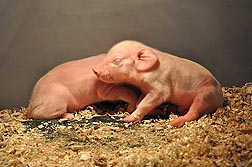This page has been archived and is being provided for reference purposes only. The page is no longer being updated, and therefore, links on the page may be invalid.
|
Read the magazine story to find out more. |
|
|
|
|
Common Plant Compound Improves Iron Absorption
By Ann PerryJanuary 2, 2008
Swine research funded in part by the Agricultural Research Service (ARS) indicates that inulin—a complex carbohydrate found in many plants worldwide—may help people absorb more iron from fruits, vegetables and grains. This finding by ARS plant physiologist Ross Welch and his colleagues could provide key support in the worldwide fight against iron deficiency.
Welch, who works at the U.S. Plant, Soil and Nutrition Laboratory in Ithaca, N.Y., was part of a study team that included Cornell University scientists Koji Yasuda, Karl Roneker, Xingen Lei and Dennis Miller. Young pigs were used for the study because their gastrointestinal tract anatomy and digestive physiology are very similar to human anatomical structures and physiological processes.
The pigs were divided into three groups. One group was fed a corn- and soy-based diet low in iron, and the other two groups were given similar diets supplemented with either 2 or 4 percent purified inulin.
Pigs that ate grains supplemented with 4 percent inulin showed a 28 percent improvement in absorbable iron and a 15 percent improvement in blood hemoglobin concentration over those consuming inulin-free feed. They also had higher soluble iron concentrations in the proximal, mid and distal colon.
Without inulin, the colon absorbs very little iron from plant-based foods such as soybeans and corn because these grains contain high amounts of phytic acid that inhibit iron absorption. But the beneficial bacteria that ferment inulin in the colon release short-chain fatty acids. These increase digestive acidity, which makes iron more soluble, and also causes mucosal cells to proliferate. This produces more cell surfaces on which iron absorption can occur.
Within these gut mucosal cells, metabolic products from inulin fermentation also activate a gene—Divalent Metal Transporter 1, or DMT1—that's responsible for a protein required for iron uptake by these cells.
These studies were co-funded by ARS and the HarvestPlus program, which is administered by the Colombia-based International Center for Tropical Agriculture and the International Food Policy Research Institute in Washington, D.C.
Read more about this research in the January 2008 issue of Agricultural Research magazine.
ARS is the U.S. Department of Agriculture's chief scientific research agency.

